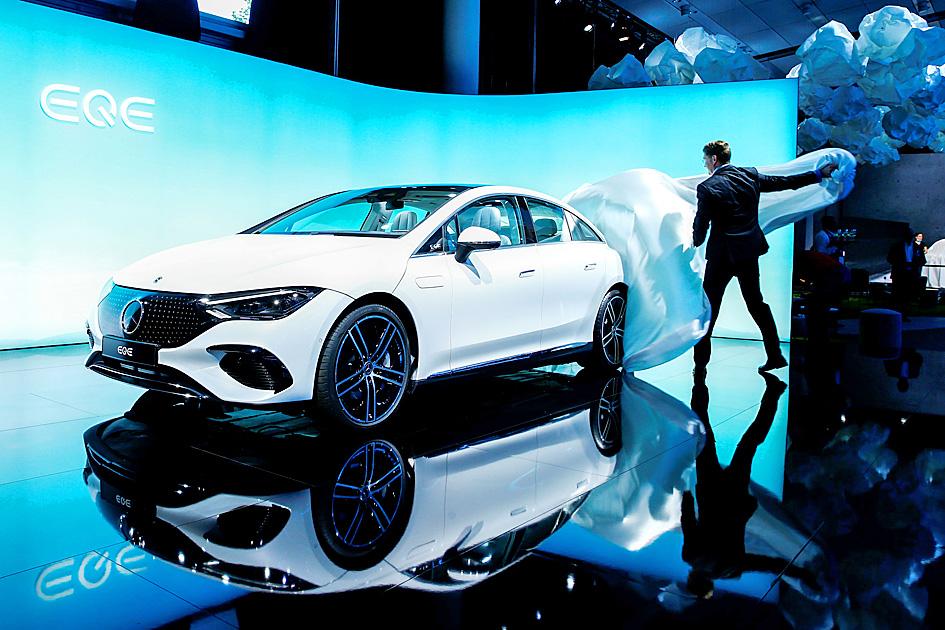Auto sales are deteriorating in Europe, with months of meek recovery giving way to deliveries that no longer even measure up to last year’s pandemic-depressed results.
New vehicle registrations fell 18 percent last month and 24 percent in July from a year earlier, the European Automobile Manufacturers’ Association said yesterday.
Sales are up just 13 percent for the year, less than half the percentage increase posted at the year’s halfway point.

Photo: Reuters
SCARCE INVENTORY
Auto production is being suppressed by a global semiconductor shortage that the chief executives of Volkswagen AG, Daimler AG and BMW AG have said would linger well into next year.
If scarce inventory were not enough to drive up prices, automakers are also prioritizing their most lucrative models as the number of vehicles they can produce is constrained.
“The chip shortage is causing production losses, and demand that’s actually high can’t be met,” EY said in a note. “Traditional combustion vehicles have been hit the most, while the boom for plug-in hybrids and electric cars continues.”
The July and August figures are the worst for the two months since the tail end of the eurozone economic crisis in 2013. The declines were broad-based, with Europe’s biggest auto markets — Germany, France, the UK, Italy and Spain — all seeing double-digit drops each month.
So far, automakers have been holding up just fine. First-half earnings, margins and cash flows were the highest in the industry’s history, Bernstein analyst Arndt Ellinghorst said in a report on Wednesday.
“Isn’t autos a funny industry,” he wrote. “The fewer cars OEMs sell, the more money they make.”
Europe’s biggest economies might be having a harder time. Supply crunches are hitting Germany beyond just the automotive sector and threatening to derail its recovery.
Of Europe’s five big markets, Spain performed worst last month, with sales plunging 29 percent, followed by Italy with a 27 percent drop.
LINGERING UNCERTAINTY
Uncertainty related to the COVID-19 pandemic likely added to problems caused by the chip shortage, RBC Capital markets analyst Joe Spak wrote in a report earlier this month.
Among the largest automakers, European sales fell 14 percent for Volkswagen Group, 29 percent for Stellantis NV and 23 percent for Renault SA last month. Registrations dropped 38 percent for Daimler AG and 18 percent for BMW AG.
“While the pandemic is not over in the region, the single biggest challenge facing the industry is now the auto chip shortage,” LMC Automotive analysts wrote in a report last week. “Any meaningful recovery in demand, following the improved economic backdrop in the region, is now being held back.”

RECYCLE: Taiwan would aid manufacturers in refining rare earths from discarded appliances, which would fit the nation’s circular economy goals, minister Kung said Taiwan would work with the US and Japan on a proposed cooperation initiative in response to Beijing’s newly announced rare earth export curbs, Minister of Economic Affairs Kung Ming-hsin (龔明鑫) said yesterday. China last week announced new restrictions requiring companies to obtain export licenses if their products contain more than 0.1 percent of Chinese-origin rare earths by value. US Secretary of the Treasury Scott Bessent on Wednesday responded by saying that Beijing was “unreliable” in its rare earths exports, adding that the US would “neither be commanded, nor controlled” by China, several media outlets reported. Japanese Minister of Finance Katsunobu Kato yesterday also

Jensen Huang (黃仁勳), founder and CEO of US-based artificial intelligence chip designer Nvidia Corp and Taiwan Semiconductor Manufacturing Co (TSMC, 台積電) on Friday celebrated the first Nvidia Blackwell wafer produced on US soil. Huang visited TSMC’s advanced wafer fab in the US state of Arizona and joined the Taiwanese chipmaker’s executives to witness the efforts to “build the infrastructure that powers the world’s AI factories, right here in America,” Nvidia said in a statement. At the event, Huang joined Y.L. Wang (王英郎), vice president of operations at TSMC, in signing their names on the Blackwell wafer to

‘DRAMATIC AND POSITIVE’: AI growth would be better than it previously forecast and would stay robust even if the Chinese market became inaccessible for customers, it said Taiwan Semiconductor Manufacturing Co (TSMC, 台積電) yesterday raised its full-year revenue growth outlook after posting record profit for last quarter, despite growing market concern about an artificial intelligence (AI) bubble. The company said it expects revenue to expand about 35 percent year-on-year, driven mainly by faster-than-expected demand for leading-edge chips for AI applications. The world’s biggest contract chipmaker in July projected that revenue this year would expand about 30 percent in US dollar terms. The company also slightly hiked its capital expenditure for this year to US$40 billion to US$42 billion, compared with US$38 billion to US$42 billion it set previously. “AI demand actually

RARE EARTHS: The call between the US Treasury Secretary and his Chinese counterpart came as Washington sought to rally G7 partners in response to China’s export controls China and the US on Saturday agreed to conduct another round of trade negotiations in the coming week, as the world’s two biggest economies seek to avoid another damaging tit-for-tat tariff battle. Beijing last week announced sweeping controls on the critical rare earths industry, prompting US President Donald Trump to threaten 100 percent tariffs on imports from China in retaliation. Trump had also threatened to cancel his expected meeting with Chinese President Xi Jinping (習近平) in South Korea later this month on the sidelines of the APEC summit. In the latest indication of efforts to resolve their dispute, Chinese state media reported that